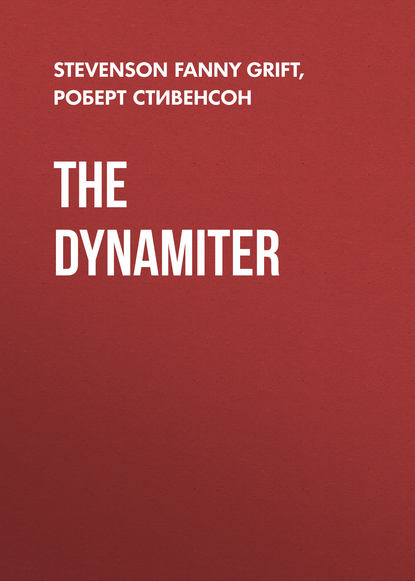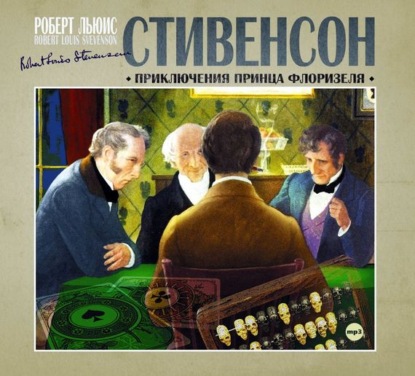 Полная версия
Полная версияПолная версия:
Роберт Льюис Стивенсон The Dynamiter
- + Увеличить шрифт
- - Уменьшить шрифт

Fanny Van de Grift Stevenson
The Dynamiter
Gentlemen, – In the volume now in your hands, the authors have touched upon that ugly devil of crime, with which it is your glory to have contended. It were a waste of ink to do so in a serious spirit. Let us dedicate our horror to acts of a more mingled strain, where crime preserves some features of nobility, and where reason and humanity can still relish the temptation. Horror, in this case, is due to Mr. Parnell: he sits before posterity silent, Mr. Forster’s appeal echoing down the ages. Horror is due to ourselves, in that we have so long coquetted with political crime; not seriously weighing, not acutely following it from cause to consequence; but with a generous, unfounded heat of sentiment, like the schoolboy with the penny tale, applauding what was specious. When it touched ourselves (truly in a vile shape), we proved false to the imaginations; discovered, in a clap, that crime was no less cruel and no less ugly under sounding names; and recoiled from our false deities.
But seriousness comes most in place when we are to speak of our defenders. Whoever be in the right in this great and confused war of politics; whatever elements of greed, whatever traits of the bully, dishonour both parties in this inhuman contest; —your side, your part, is at least pure of doubt. Yours is the side of the child, of the breeding woman, of individual pity and public trust. If our society were the mere kingdom of the devil (as indeed it wears some of his colours) it yet embraces many precious elements and many innocent persons whom it is a glory to defend. Courage and devotion, so common in the ranks of the police, so little recognised, so meagrely rewarded, have at length found their commemoration in an historical act. History, which will represent Mr. Parnell sitting silent under the appeal of Mr. Forster, and Gordon setting forth upon his tragic enterprise, will not forget Mr. Cole carrying the dynamite in his defenceless hands, nor Mr. Cox coming coolly to his aid.
ROBERT LOUIS STEVENSONFANNY VAN de GRIFT STEVENSONA NOTE FOR THE READER
It is within the bounds of possibility that you may take up this volume, and yet be unacquainted with its predecessor: the first series of New Arabian Nights. The loss is yours – and mine; or to be more exact, my publishers’. But if you are thus unlucky, the least I can do is to pass you a hint. When you shall find a reference in the following pages to one Theophilus Godall of the Bohemian Cigar Divan in Rupert Street, Soho, you must be prepared to recognise, under his features, no less a person than Prince Florizel of Bohemia, formerly one of the magnates of Europe, now dethroned, exiled, impoverished, and embarked in the tobacco trade.
R. L. S.PROLOGUE OF THE CIGAR DIVAN
In the city of encounters, the Bagdad of the West, and, to be more precise, on the broad northern pavement of Leicester Square, two young men of five- or six-and-twenty met after years of separation. The first, who was of a very smooth address and clothed in the best fashion, hesitated to recognise the pinched and shabby air of his companion.
‘What!’ he cried, ‘Paul Somerset!’
‘I am indeed Paul Somerset,’ returned the other, ‘or what remains of him after a well-deserved experience of poverty and law. But in you, Challoner, I can perceive no change; and time may be said, without hyperbole, to write no wrinkle on your azure brow.’
‘All,’ replied Challoner, ‘is not gold that glitters. But we are here in an ill posture for confidences, and interrupt the movement of these ladies. Let us, if you please, find a more private corner.’
‘If you will allow me to guide you,’ replied Somerset, ‘I will offer you the best cigar in London.’
And taking the arm of his companion, he led him in silence and at a brisk pace to the door of a quiet establishment in Rupert Street, Soho. The entrance was adorned with one of those gigantic Highlanders of wood which have almost risen to the standing of antiquities; and across the window-glass, which sheltered the usual display of pipes, tobacco, and cigars, there ran the gilded legend: ‘Bohemian Cigar Divan, by T. Godall.’ The interior of the shop was small, but commodious and ornate; the salesman grave, smiling, and urbane; and the two young men, each puffing a select regalia, had soon taken their places on a sofa of mouse-coloured plush and proceeded to exchange their stories.
‘I am now,’ said Somerset, ‘a barrister; but Providence and the attorneys have hitherto denied me the opportunity to shine. A select society at the Cheshire Cheese engaged my evenings; my afternoons, as Mr. Godall could testify, have been generally passed in this divan; and my mornings, I have taken the precaution to abbreviate by not rising before twelve. At this rate, my little patrimony was very rapidly, and I am proud to remember, most agreeably expended. Since then a gentleman, who has really nothing else to recommend him beyond the fact of being my maternal uncle, deals me the small sum of ten shillings a week; and if you behold me once more revisiting the glimpses of the street lamps in my favourite quarter, you will readily divine that I have come into a fortune.’
‘I should not have supposed so,’ replied Challoner. ‘But doubtless I met you on the way to your tailors.’
‘It is a visit that I purpose to delay,’ returned Somerset, with a smile. ‘My fortune has definite limits. It consists, or rather this morning it consisted, of one hundred pounds.’
‘That is certainly odd,’ said Challoner; ‘yes, certainly the coincidence is strange. I am myself reduced to the same margin.’
‘You!’ cried Somerset. ‘And yet Solomon in all his glory – ’
‘Such is the fact. I am, dear boy, on my last legs,’ said Challoner. ‘Besides the clothes in which you see me, I have scarcely a decent trouser in my wardrobe; and if I knew how, I would this instant set about some sort of work or commerce. With a hundred pounds for capital, a man should push his way.’
‘It may be,’ returned Somerset; ‘but what to do with mine is more than I can fancy. Mr. Godall,’ he added, addressing the salesman, ‘you are a man who knows the world: what can a young fellow of reasonable education do with a hundred pounds?’
‘It depends,’ replied the salesman, withdrawing his cheroot. ‘The power of money is an article of faith in which I profess myself a sceptic. A hundred pounds will with difficulty support you for a year; with somewhat more difficulty you may spend it in a night; and without any difficulty at all you may lose it in five minutes on the Stock Exchange. If you are of that stamp of man that rises, a penny would be as useful; if you belong to those that fall, a penny would be no more useless. When I was myself thrown unexpectedly upon the world, it was my fortune to possess an art: I knew a good cigar. Do you know nothing, Mr. Somerset?’
‘Not even law,’ was the reply.
‘The answer is worthy of a sage,’ returned Mr. Godall. ‘And you, sir,’ he continued, turning to Challoner, ‘as the friend of Mr. Somerset, may I be allowed to address you the same question?’
‘Well,’ replied Challoner, ‘I play a fair hand at whist.’
‘How many persons are there in London,’ returned the salesman, ‘who have two-and-thirty teeth? Believe me, young gentleman, there are more still who play a fair hand at whist. Whist, sir, is wide as the world; ’tis an accomplishment like breathing. I once knew a youth who announced that he was studying to be Chancellor of England; the design was certainly ambitious; but I find it less excessive than that of the man who aspires to make a livelihood by whist.’
‘Dear me,’ said Challoner, ‘I am afraid I shall have to fall to be a working man.’
‘Fall to be a working man?’ echoed Mr. Godall. ‘Suppose a rural dean to be unfrocked, does he fall to be a major? suppose a captain were cashiered, would he fall to be a puisne judge? The ignorance of your middle class surprises me. Outside itself, it thinks the world to lie quite ignorant and equal, sunk in a common degradation; but to the eye of the observer, all ranks are seen to stand in ordered hierarchies, and each adorned with its particular aptitudes and knowledge. By the defects of your education you are more disqualified to be a working man than to be the ruler of an empire. The gulf, sir, is below; and the true learned arts – those which alone are safe from the competition of insurgent laymen – are those which give his title to the artisan.’
‘This is a very pompous fellow,’ said Challoner, in the ear of his companion.
‘He is immense,’ said Somerset.
Just then the door of the divan was opened, and a third young fellow made his appearance, and rather bashfully requested some tobacco. He was younger than the others; and, in a somewhat meaningless and altogether English way, he was a handsome lad. When he had been served, and had lighted his pipe and taken his place upon the sofa, he recalled himself to Challoner by the name of Desborough.
‘Desborough, to be sure,’ cried Challoner. ‘Well, Desborough, and what do you do?’
‘The fact is,’ said Desborough, ‘that I am doing nothing.’
‘A private fortune possibly?’ inquired the other.
‘Well, no,’ replied Desborough, rather sulkily. ‘The fact is that I am waiting for something to turn up.’
‘All in the same boat!’ cried Somerset. ‘And have you, too, one hundred pounds?’
‘Worse luck,’ said Mr. Desborough.
‘This is a very pathetic sight, Mr. Godall,’ said Somerset: ‘Three futiles.’
‘A character of this crowded age,’ returned the salesman.
‘Sir,’ said Somerset, ‘I deny that the age is crowded; I will admit one fact, and one fact only: that I am futile, that he is futile, and that we are all three as futile as the devil. What am I? I have smattered law, smattered letters, smattered geography, smattered mathematics; I have even a working knowledge of judicial astrology; and here I stand, all London roaring by at the street’s end, as impotent as any baby. I have a prodigious contempt for my maternal uncle; but without him, it is idle to deny it, I should simply resolve into my elements like an unstable mixture. I begin to perceive that it is necessary to know some one thing to the bottom – were it only literature. And yet, sir, the man of the world is a great feature of this age; he is possessed of an extraordinary mass and variety of knowledge; he is everywhere at home; he has seen life in all its phases; and it is impossible but that this great habit of existence should bear fruit. I count myself a man of the world, accomplished, cap-à-pie. So do you, Challoner. And you, Mr. Desborough?’
‘Oh yes,’ returned the young man.
‘Well then, Mr. Godall, here we stand, three men of the world, without a trade to cover us, but planted at the strategic centre of the universe (for so you will allow me to call Rupert Street), in the midst of the chief mass of people, and within ear-shot of the most continuous chink of money on the surface of the globe. Sir, as civilised men, what do we do? I will show you. You take in a paper?’
‘I take,’ said Mr. Godall solemnly, ‘the best paper in the world, the Standard.’
‘Good,’ resumed Somerset. ‘I now hold it in my hand, the voice of the world, a telephone repeating all men’s wants. I open it, and where my eye first falls – well, no, not Morrison’s Pills – but here, sure enough, and but a little above, I find the joint that I was seeking; here is the weak spot in the armour of society. Here is a want, a plaint, an offer of substantial gratitude: “Two hundred Pounds Reward. – The above reward will be paid to any person giving information as to the identity and whereabouts of a man observed yesterday in the neighbourhood of the Green Park. He was over six feet in height, with shoulders disproportionately broad, close shaved, with black moustaches, and wearing a sealskin great-coat.” There, gentlemen, our fortune, if not made, is founded.’
‘Do you then propose, dear boy, that we should turn detectives?’ inquired Challoner.
‘Do I propose it? No, sir,’ cried Somerset. ‘It is reason, destiny, the plain face of the world, that commands and imposes it. Here all our merits tell; our manners, habit of the world, powers of conversation, vast stores of unconnected knowledge, all that we are and have builds up the character of the complete detective. It is, in short, the only profession for a gentleman.’
‘The proposition is perhaps excessive,’ replied Challoner; ‘for hitherto I own I have regarded it as of all dirty, sneaking, and ungentlemanly trades, the least and lowest.’
‘To defend society?’ asked Somerset; ‘to stake one’s life for others? to deracinate occult and powerful evil? I appeal to Mr. Godall. He, at least, as a philosophic looker-on at life, will spit upon such philistine opinions. He knows that the policeman, as he is called upon continually to face greater odds, and that both worse equipped and for a better cause, is in form and essence a more noble hero than the soldier. Do you, by any chance, deceive yourself into supposing that a general would either ask or expect, from the best army ever marshalled, and on the most momentous battle-field, the conduct of a common constable at Peckham Rye?’ 1
‘I did not understand we were to join the force,’ said Challoner.
‘Nor shall we. These are the hands; but here – here, sir, is the head,’ cried Somerset. ‘Enough; it is decreed. We shall hunt down this miscreant in the sealskin coat.’
‘Suppose that we agreed,’ retorted Challoner, ‘you have no plan, no knowledge; you know not where to seek for a beginning.’
‘Challoner!’ cried Somerset, ‘is it possible that you hold the doctrine of Free Will? And are you devoid of any tincture of philosophy, that you should harp on such exploded fallacies? Chance, the blind Madonna of the Pagan, rules this terrestrial bustle; and in Chance I place my sole reliance. Chance has brought us three together; when we next separate and go forth our several ways, Chance will continually drag before our careless eyes a thousand eloquent clues, not to this mystery only, but to the countless mysteries by which we live surrounded. Then comes the part of the man of the world, of the detective born and bred. This clue, which the whole town beholds without comprehension, swift as a cat, he leaps upon it, makes it his, follows it with craft and passion, and from one trifling circumstance divines a world.’
‘Just so,’ said Challoner; ‘and I am delighted that you should recognise these virtues in yourself. But in the meanwhile, dear boy, I own myself incapable of joining. I was neither born nor bred as a detective, but as a placable and very thirsty gentleman; and, for my part, I begin to weary for a drink. As for clues and adventures, the only adventure that is ever likely to occur to me will be an adventure with a bailiff.’
‘Now there is the fallacy,’ cried Somerset. ‘There I catch the secret of your futility in life. The world teems and bubbles with adventure; it besieges you along the street: hands waving out of windows, swindlers coming up and swearing they knew you when you were abroad, affable and doubtful people of all sorts and conditions begging and truckling for your notice. But not you: you turn away, you walk your seedy mill round, you must go the dullest way. Now here, I beg of you, the next adventure that offers itself, embrace it in with both your arms; whatever it looks, grimy or romantic, grasp it. I will do the like; the devil is in it, but at least we shall have fun; and each in turn we shall narrate the story of our fortunes to my philosophic friend of the divan, the great Godall, now hearing me with inward joy. Come, is it a bargain? Will you, indeed, both promise to welcome every chance that offers, to plunge boldly into every opening, and, keeping the eye wary and the head composed, to study and piece together all that happens? Come, promise: let me open to you the doors of the great profession of intrigue.’
‘It is not much in my way,’ said Challoner, ‘but, since you make a point of it, amen.’
‘I don’t mind promising,’ said Desborough, ‘but nothing will happen to me.’
‘O faithless ones!’ cried Somerset. ‘But at least I have your promises; and Godall, I perceive, is transported with delight.’
‘I promise myself at least much pleasure from your various narratives,’ said the salesman, with the customary calm polish of his manner.
‘And now, gentlemen,’ concluded Somerset, ‘let us separate. I hasten to put myself in fortune’s way. Hark how, in this quiet corner, London roars like the noise of battle; four million destinies are here concentred; and in the strong panoply of one hundred pounds, payable to the bearer, I am about to plunge into that web.’
CHALLONER’S ADVENTURE
THE SQUIRE OF DAMESMr. Edward Challoner had set up lodgings in the suburb of Putney, where he enjoyed a parlour and bedroom and the sincere esteem of the people of the house. To this remote home he found himself, at a very early hour in the morning of the next day, condemned to set forth on foot. He was a young man of a portly habit; no lover of the exercises of the body; bland, sedentary, patient of delay, a prop of omnibuses. In happier days he would have chartered a cab; but these luxuries were now denied him; and with what courage he could muster he addressed himself to walk.
It was then the height of the season and the summer; the weather was serene and cloudless; and as he paced under the blinded houses and along the vacant streets, the chill of the dawn had fled, and some of the warmth and all the brightness of the July day already shone upon the city. He walked at first in a profound abstraction, bitterly reviewing and repenting his performances at whist; but as he advanced into the labyrinth of the south-west, his ear was gradually mastered by the silence. Street after street looked down upon his solitary figure, house after house echoed upon his passage with a ghostly jar, shop after shop displayed its shuttered front and its commercial legend; and meanwhile he steered his course, under day’s effulgent dome and through this encampment of diurnal sleepers, lonely as a ship.
‘Here,’ he reflected, ‘if I were like my scatter-brained companion, here were indeed the scene where I might look for an adventure. Here, in broad day, the streets are secret as in the blackest night of January, and in the midst of some four million sleepers, solitary as the woods of Yucatan. If I but raise my voice I could summon up the number of an army, and yet the grave is not more silent than this city of sleep.’
He was still following these quaint and serious musings when he came into a street of more mingled ingredients than was common in the quarter. Here, on the one hand, framed in walls and the green tops of trees, were several of those discreet, bijou residences on which propriety is apt to look askance. Here, too, were many of the brick-fronted barracks of the poor; a plaster cow, perhaps, serving as ensign to a dairy, or a ticket announcing the business of the mangler. Before one such house, that stood a little separate among walled gardens, a cat was playing with a straw, and Challoner paused a moment, looking on this sleek and solitary creature, who seemed an emblem of the neighbouring peace. With the cessation of the sound of his own steps the silence fell dead; the house stood smokeless: the blinds down, the whole machinery of life arrested; and it seemed to Challoner that he should hear the breathing of the sleepers.
As he so stood, he was startled by a dull and jarring detonation from within. This was followed by a monstrous hissing and simmering as from a kettle of the bigness of St. Paul’s; and at the same time from every chink of door and window spirted an ill-smelling vapour. The cat disappeared with a cry. Within the lodging-house feet pounded on the stairs; the door flew back, emitting clouds of smoke; and two men and an elegantly dressed young lady tumbled forth into the street and fled without a word. The hissing had already ceased, the smoke was melting in the air, the whole event had come and gone as in a dream, and still Challoner was rooted to the spot. At last his reason and his fear awoke together, and with the most unwonted energy he fell to running.
Little by little this first dash relaxed, and presently he had resumed his sober gait and begun to piece together, out of the confused report of his senses, some theory of the occurrence. But the occasion of the sounds and stench that had so suddenly assailed him, and the strange conjunction of fugitives whom he had seen to issue from the house, were mysteries beyond his plummet. With an obscure awe he considered them in his mind, continuing, meanwhile, to thread the web of streets, and once more alone in morning sunshine.
In his first retreat he had entirely wandered; and now, steering vaguely west, it was his luck to light upon an unpretending street, which presently widened so as to admit a strip of gardens in the midst. Here was quite a stir of birds; even at that hour, the shadow of the leaves was grateful; instead of the burnt atmosphere of cities, there was something brisk and rural in the air; and Challoner paced forward, his eyes upon the pavement and his mind running upon distant scenes, till he was recalled, upon a sudden, by a wall that blocked his further progress. This street, whose name I have forgotten, is no thoroughfare.
He was not the first who had wandered there that morning; for as he raised his eyes with an agreeable deliberation, they alighted on the figure of a girl, in whom he was struck to recognise the third of the incongruous fugitives. She had run there, seemingly, blindfold; the wall had checked her career: and being entirely wearied, she had sunk upon the ground beside the garden railings, soiling her dress among the summer dust. Each saw the other in the same instant of time; and she, with one wild look, sprang to her feet and began to hurry from the scene.
Challoner was doubly startled to meet once more the heroine of his adventure, and to observe the fear with which she shunned him. Pity and alarm, in nearly equal forces, contested the possession of his mind; and yet, in spite of both, he saw himself condemned to follow in the lady’s wake. He did so gingerly, as fearing to increase her terrors; but, tread as lightly as he might, his footfalls eloquently echoed in the empty street. Their sound appeared to strike in her some strong emotion; for scarce had he begun to follow ere she paused. A second time she addressed herself to flight; and a second time she paused. Then she turned about, and with doubtful steps and the most attractive appearance of timidity, drew near to the young man. He on his side continued to advance with similar signals of distress and bashfulness. At length, when they were but some steps apart, he saw her eyes brim over, and she reached out both her hands in eloquent appeal.
‘Are you an English gentleman?’ she cried.
The unhappy Challoner regarded her with consternation. He was the spirit of fine courtesy, and would have blushed to fail in his devoirs to any lady; but, in the other scale, he was a man averse from amorous adventures. He looked east and west; but the houses that looked down upon this interview remained inexorably shut; and he saw himself, though in the full glare of the day’s eye, cut off from any human intervention. His looks returned at last upon the suppliant. He remarked with irritation that she was charming both in face and figure, elegantly dressed and gloved; a lady undeniable; the picture of distress and innocence; weeping and lost in the city of diurnal sleep.
‘Madam,’ he said, ‘I protest you have no cause to fear intrusion; and if I have appeared to follow you, the fault is in this street, which has deceived us both.’ An unmistakable relief appeared upon the lady’s face. ‘I might have guessed it!’ she exclaimed. ‘Thank you a thousand times! But at this hour, in this appalling silence, and among all these staring windows, I am lost in terrors – oh, lost in them!’ she cried, her face blanching at the words. ‘I beg you to lend me your arm,’ she added with the loveliest, suppliant inflection. ‘I dare not go alone; my nerve is gone – I had a shock, oh, what a shock! I beg of you to be my escort.’



